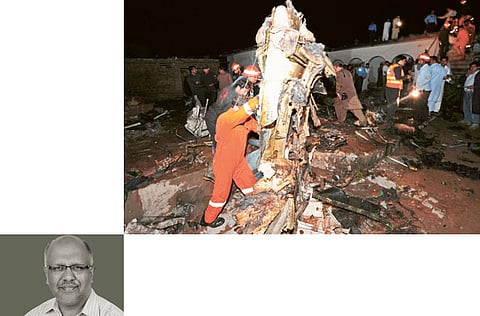Learning from tragedy
Suggestions that Bhoja Air may have been allowed to operate without meeting adequate safety standards must be thoroughly investigated

A tragic plane crash near Islamabad on Friday may have been caused by a range of factors from pilot error to weather conditions to technical fault. While it's too early to explain exactly what brought down the Boeing 737 flown by Pakistan's privately owned Bhoja Air which killed all 127 people on board, there is a much broader issue at stake. Pakistan has had previous terrible tragedies too, but people have found themselves eventually in the dark on what may have caused them.
In spite of a proliferation of privately owned TV channels along with fewer constraints on the flow of information via the internet, Pakistanis continue to suffer from a dearth of information on some key events.
While the country's rulers ad nauseam remind the people of the arrival of a free democracy, they have failed to set in motion the framework in support of values central to the best traditions of political freedom. Being forthcoming on a tragedy such as the one that took place on Friday must be a litmus test for the extent to which Pakistan has indeed become a truly democratic state.
The Bhoja Air crash indeed marks the second time that the Pakistani capital has witnessed such a terrible tragedy in recent times. Less than two years ago, an ill-fated aircraft flown by the privately owned Air Blue crashed into the Margalla Hills overlooking Pakistan's capital. A report indeed was prepared following that tragedy, though its findings remain far removed from the public eye. What caused that tragic disaster remains the subject of speculation ranging from poor visibility to the error of the pilot who may have been up the previous night.
For Pakistanis to become exactly aware of what lies behind tragedies that have caused a large scale loss of life, change for the better has to be led by the ruling structure. Other than issuing statements offering condolences, the country's top leaders appear to have little interest in leading progressive change for the better.
Disaster management
Just as in times after previous large-scale tragedies such as the Air Blue disaster, there will likely be little effort by the parliament, for instance, to oversee a comprehensive investigation in the Bhoja Air affair. Suggestions that the airline may have been allowed to operate without meeting adequate safety standards must be thoroughly investigated. It is also vital that the findings must then be widely disseminated through the Pakistani media to ensure that the Pakistani public gets a full insight into exactly what may have caused the crash.
The lessons learnt from the tragedy then need to be applied to improve safety standards in ways that will improve the overall environment across Pakistan. In the aftermath of Friday's tragedy, some across Pakistan called in to question the role of an agency like the National Disaster Management Authority (NDMA). Based in Islamabad, the authority is a federal body which is responsible for reacting quickly to tragic events.
Yet its absence from the aftermath of Friday's scene says much about the body itself. More importantly, it said a lot about the way Pakistan has come to be ruled by a deeply and increasingly controversial political class. Left to continue along their chosen path, the likes of President Asif Ali Zardari, Prime Minister Yousuf Raza Gilani and the coterie of politicians they lead will just choose to remain surrounded by complacency. In advancing towards likely parliamentary elections within a year, key members of Pakistan's political class may well be even more obsessed with their political future rather than the welfare of the country's population.
Caught in the midst of a hopeless situation, Pakistanis are right to resign themselves to more of the same under the country's present ruling class. They must clamour hard to press for a regime change which simply doesn't throw up new faces but indeed presents an improved quality of government. Ultimately, those who rule Pakistan will simply choose to quit the country if need be. But for Pakistan's mainstream population, abandoning their country is just not a feasible choice.
Farhan Bokhari is a Pakistan-based commentator who writes on political and economic matters.



